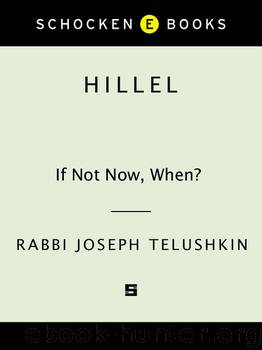Hillel by Joseph Telushkin

Author:Joseph Telushkin [Telushkin, Rabbi Joseph]
Language: eng
Format: epub
ISBN: 978-0-8052-4289-8
Publisher: Knopf Doubleday Publishing Group
Published: 2010-09-14T04:00:00+00:00
Several important, infrequently commented upon, and still applicable lessons emerge from this passage:
There isn’t necessarily only one way to perform a ritual act that’s acceptable to God. The disputes of Hillel and Shammai were largely about issues such as purity and impurity, and matters concerning blessings, issues for which you would think that there is only one right way. Nonetheless, the heavenly voice teaches: “The teachings of both are the words of the living God.”
We should look for and seek to identify the “words of the living God” even in opinions with which we disagree. Rabbi Irwin Kula speaks of the need to identify “partial” truths in these instances. Such an ideology must have motivated the members of the School of Hillel. Why else would they have studied Shammai’s rulings, and even studied them first? Apparently, they wanted to study the reasonings of the other side. Humility also played a role in the educational agenda of each school. The Shammaites, who assumed, with a certain measure of arrogance, that they had nothing to learn from the School of Hillel, “wasted” no time studying their rulings. The more humble Hillelites did not assume that they possessed the full truth, and therefore considered opposing viewpoints. It was this that enabled them to acknowledge instances in which the Shammaite position made more sense. Humility is, therefore, not only an attractive personal attribute, it also leads to a greater grasp of the truth.
The unwillingness of the Shammaites to study and consider the Hillelites’ views might explain why they later grew violent in their opposition to the School of Hillel. Associating only with like-minded people, reinforcing one another’s views without ever hearing a credible exposition of opposing views, might have caused them to think that those who thought differently from them were not only wrong, but evil. A contemporary upshot of this text is that we should not read only books and publications that agree with and reinforce what we already believe. Many people do so and never learn what those who disagree with them believe. As my friend the radio talk show commentator Dennis Prager likes to say, “One of the most important days in the life of a religious person is the day he meets a person of a different religion, or of a different denomination within his own religion, who is both a good person and intelligent.” After such an encounter, it becomes less easy to reflexively dismiss without consideration the arguments of the other side, or to construct superficial and unfair stereotypes of those who disagree with you. Perhaps that is why, fearing that distinctions would be blurred, the School of Shammai did not wish to study the arguments of the School of Hillel or have their students mix with people unlike themselves.
Download
This site does not store any files on its server. We only index and link to content provided by other sites. Please contact the content providers to delete copyright contents if any and email us, we'll remove relevant links or contents immediately.
| Africa | Americas |
| Arctic & Antarctica | Asia |
| Australia & Oceania | Europe |
| Middle East | Russia |
| United States | World |
| Ancient Civilizations | Military |
| Historical Study & Educational Resources |
Cecilia; Or, Memoirs of an Heiress — Volume 1 by Fanny Burney(32508)
Cecilia; Or, Memoirs of an Heiress — Volume 2 by Fanny Burney(31916)
Cecilia; Or, Memoirs of an Heiress — Volume 3 by Fanny Burney(31900)
The Secret History by Donna Tartt(18962)
Sapiens: A Brief History of Humankind by Yuval Noah Harari(14328)
Leonardo da Vinci by Walter Isaacson(13246)
The Radium Girls by Kate Moore(11980)
Sapiens by Yuval Noah Harari(5334)
How Democracies Die by Steven Levitsky & Daniel Ziblatt(5180)
The Wind in My Hair by Masih Alinejad(5061)
Homo Deus: A Brief History of Tomorrow by Yuval Noah Harari(4877)
Endurance: Shackleton's Incredible Voyage by Alfred Lansing(4726)
Man's Search for Meaning by Viktor Frankl(4515)
The Silk Roads by Peter Frankopan(4495)
Millionaire: The Philanderer, Gambler, and Duelist Who Invented Modern Finance by Janet Gleeson(4427)
The Rape of Nanking by Iris Chang(4177)
Joan of Arc by Mary Gordon(4062)
The Motorcycle Diaries by Ernesto Che Guevara(4057)
Hitler in Los Angeles by Steven J. Ross(3926)
